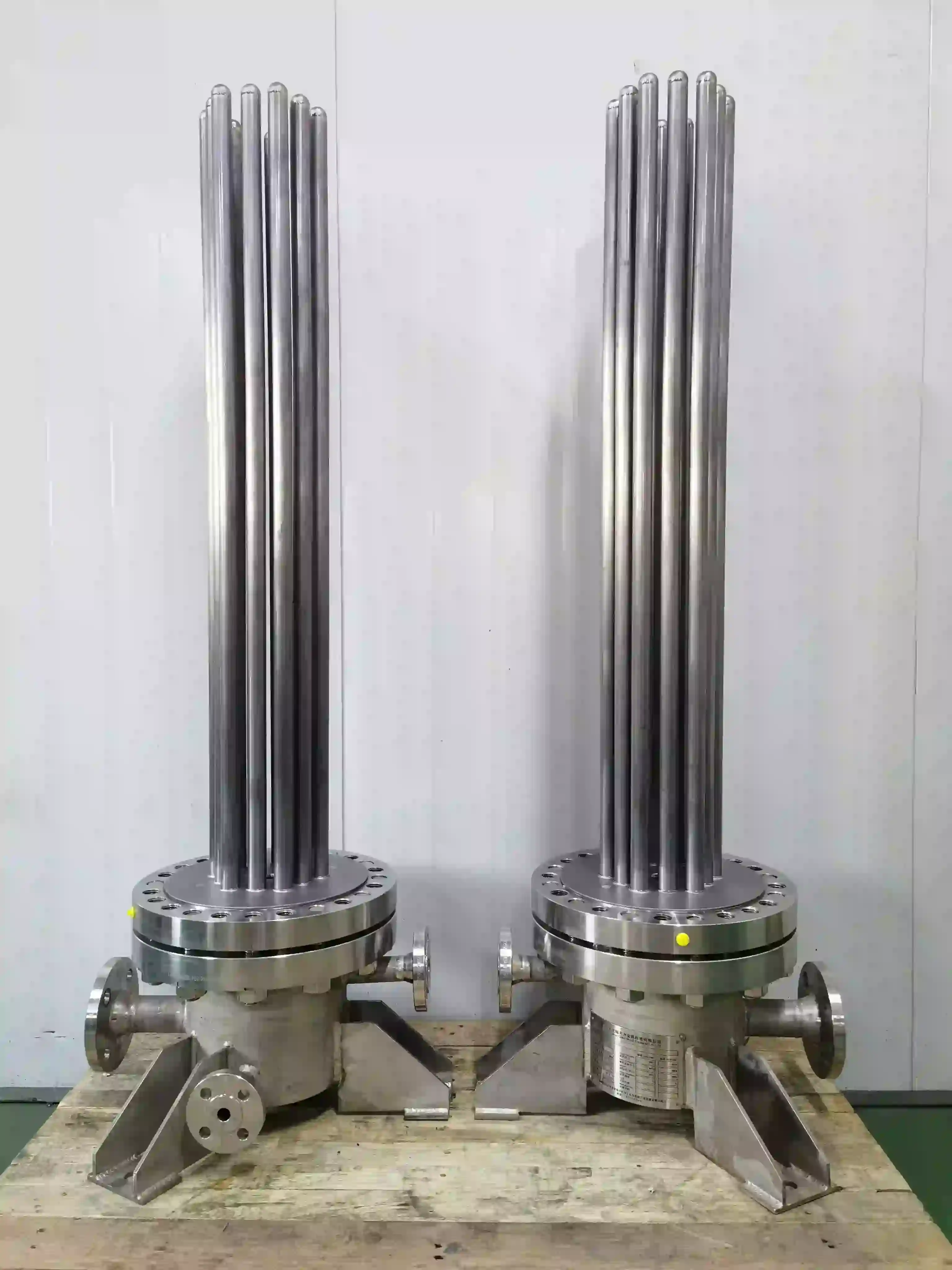In industries where extreme conditions and corrosive environments are commonplace, the need for specialized heating solutions is critical. Among the various options available, the vertical tantalum bayonet heater stands out as a highly efficient and durable choice for heating applications in aggressive chemical and industrial processes. In this article, Qiwei delves into the applications of vertical tantalum bayonet heaters, showcasing their vital role in demanding industrial environments.
What is a Vertical Tantalum Bayonet Heater?

A vertical tantalum bayonet heater is a robust and corrosion-resistant heating device designed to handle aggressive chemical environments where traditional heaters fail. These heaters are constructed using tantalum, a rare and highly corrosion-resistant metal, making them ideal for heating highly corrosive fluids, such as acids, in chemical and industrial processes. The term "bayonet" refers to the heater's unique design, where the heating element is enclosed within a sheath, allowing for indirect heating of the process fluid.
The vertical orientation of the heater is specifically engineered for systems where space is limited or where vertical installation provides operational or maintenance advantages. Vertical tantalum bayonet heaters are often used in reactors, tanks, and other industrial systems that require precise and reliable heating under harsh conditions.
Tantalum, the primary material used in these heaters, is renowned for its exceptional resistance to chemical attack, even by strong acids like hydrochloric acid (HCl) and sulfuric acid (H₂SO₄). This property ensures that the heater remains operational and efficient in environments that would quickly degrade other materials.
Applications of Vertical Tantalum Bayonet Heaters
Vertical tantalum bayonet heaters are utilized across a wide range of industries where aggressive chemicals and high temperatures are part of daily operations. Below are some of the primary applications where these heaters excel.
1. Chemical Processing
In chemical processing plants, vertical tantalum bayonet heaters are used to heat highly corrosive fluids such as acids, alkalis, and chemical mixtures. These heaters are often installed in reactors, evaporators, and tanks where temperature control is critical to the process. For example, in the production of hydrochloric acid, where the process involves highly corrosive gases and liquids, tantalum’s corrosion resistance ensures that the heater performs reliably without contamination or material degradation. The vertical design allows the heater to be easily integrated into chemical tanks, providing uniform and efficient heating.
2. Pharmaceutical Manufacturing
Pharmaceutical production often involves the use of highly pure and corrosive chemicals. Vertical tantalum bayonet heaters are employed in applications such as heating ultra-pure water, concentrated acids, and other corrosive reagents used in drug synthesis and formulation. Their ability to provide contamination-free heating makes them an ideal choice for pharmaceutical processes where material purity is of utmost importance. The heaters' vertical orientation also facilitates space-saving installation in confined areas, such as laboratory setups or compact production lines.
3. Petrochemical and Refining Industries
The petrochemical and refining industries rely heavily on vertical tantalum bayonet heaters for processes involving corrosive hydrocarbons, acidic fluids, and sulfur compounds. These heaters are used in equipment like stripping columns, desulfurization units, and reboilers, where harsh chemicals are encountered. By ensuring reliable and efficient heating in these environments, vertical tantalum bayonet heaters contribute to the efficiency and safety of petrochemical processes. Their resistance to corrosion ensures a long operational life, reducing maintenance downtime and costs.
4. Metal Plating and Surface Treatment
Electroplating and surface treatment processes often require the use of corrosive solutions, such as sulfuric acid, nitric acid, or hydrochloric acid baths. Vertical tantalum bayonet heaters are employed to heat these baths to the required temperatures, ensuring consistent and uniform results. The heaters' durability and corrosion resistance ensure that they perform reliably in these aggressive environments, maintaining the integrity of the plating process and extending the life of the equipment.
5. Fertilizer Production
In the production of fertilizers, processes such as phosphoric acid extraction and ammonia synthesis involve highly corrosive chemicals. Vertical tantalum bayonet heaters are used in these applications to maintain precise temperatures while resisting corrosion from acidic and alkaline environments.The heaters' ability to provide efficient heating without contamination ensures that the chemical processes are carried out safely and effectively, enhancing the overall productivity of fertilizer plants.
The vertical tantalum bayonet heater is an indispensable solution for industries that require reliable, efficient, and contamination-free heating in corrosive environments. Its unique design, corrosion resistance, and versatility make it ideal for applications ranging from chemical processing and pharmaceuticals to petrochemicals and metal plating. By providing consistent and reliable performance, vertical tantalum bayonet heaters enhance the safety, efficiency, and productivity of industrial processes, ensuring long-term operational success. For any application involving aggressive chemicals and extreme conditions, these heaters stand out as the gold standard in industrial heating solutions.
https://www.tnztn.com/Vertical-Tantalum-Bayonet-Heater.html
www.tnztn.com
Wuxi Qiwei Nonferrous Technology Co., Ltd.

+ There are no comments
Add yours